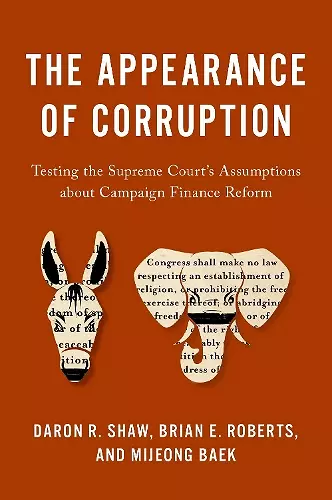The Appearance of Corruption
Testing the Supreme Court's Assumptions about Campaign Finance Reform
Daron R Shaw author Brian E Roberts author Mijeong Baek author
Format:Hardback
Publisher:Oxford University Press Inc
Published:15th Apr '21
Currently unavailable, and unfortunately no date known when it will be back

A critical analysis of the connections that the United States Supreme Court has made between campaign finance regulations and voters' behavior. The sanctity of political speech is a key element of the United States Constitution and a cornerstone of the American republic. When the Supreme Court linked political speech to campaign finance in its landmark Buckley v. Valeo (1976) decision, the modern era of campaign finance regulation was born. The decision stated that in order to pass constitutional muster, any laws limiting money in politics must be narrowly tailored and serve a compelling state interest. The lone state interest the Court was willing to entertain was the mitigation of corruption. In order to reach this conclusion, the Court advanced a sophisticated behavioral model that made assumptions about how laws affect voters' opinions and behavior. These assumptions have received surprisingly little attention until now. In The Appearance of Corruption, Daron Shaw, Brian Roberts, and Mijeong Baek analyze the connections that the Court made between campaign finance regulations and voters' behavior. The court argued that an increase in perceived corruption would lower engagement and turnout. Drawing from original survey data and experiments, they confront the question of what happens when the Supreme Court is wrong-and when the foundation of over 40 years of jurisprudence is simply not true. Even with the heightened awareness of campaign finance issues that emerged in the wake of the 2010 Citizens United decision, there is little empirical support for the Court's reasoning that turnout would decline. A rigorous statistical analysis, this is the first work to simultaneously name and test each and every one of the Court's assumptions in the pre- and post-Citizen's United eras. It will also fundamentally reshape how we think about campaign finance regulation's effects on voter behavior.
This masterful treatise is a highly engaging and lucid analysis of Supreme Court jurisprudence on money in politics. Shaw, Roberts and Baek are first-rate scholars and communicators. They pinpoint key assertions about political behavior underlying Court opinions, then put these claims to the test in a series of empirical chapters. This logical and even-handed approach is a refreshing reprieve from the usual demagoguery that dominates the policy debate over campaign financing. The result is a compelling civics lesson not just for students of American government, but for any citizen concerned about the influence of money in politics. * Jeff Milyo, Chairman and Professor of Economics, Economics, University of Missouri *
The Supreme Court, through decisions like Citizens United, have had the most powerful impact on the design of campaign finance laws. This books questions whether they have been flying blind with their assumptions about perceived corruption and its impact on American's trust and participation. The book should have a significant impact on how we think about campaign finance reform and hopefully spur some innovative thinking. It is must read for policymakers scholars, students and the engaged public. * Raymond La Raja, Professor of Political Science, University of Massachusetts Amherst *
ISBN: 9780197548417
Dimensions: 155mm x 236mm x 20mm
Weight: 454g
200 pages